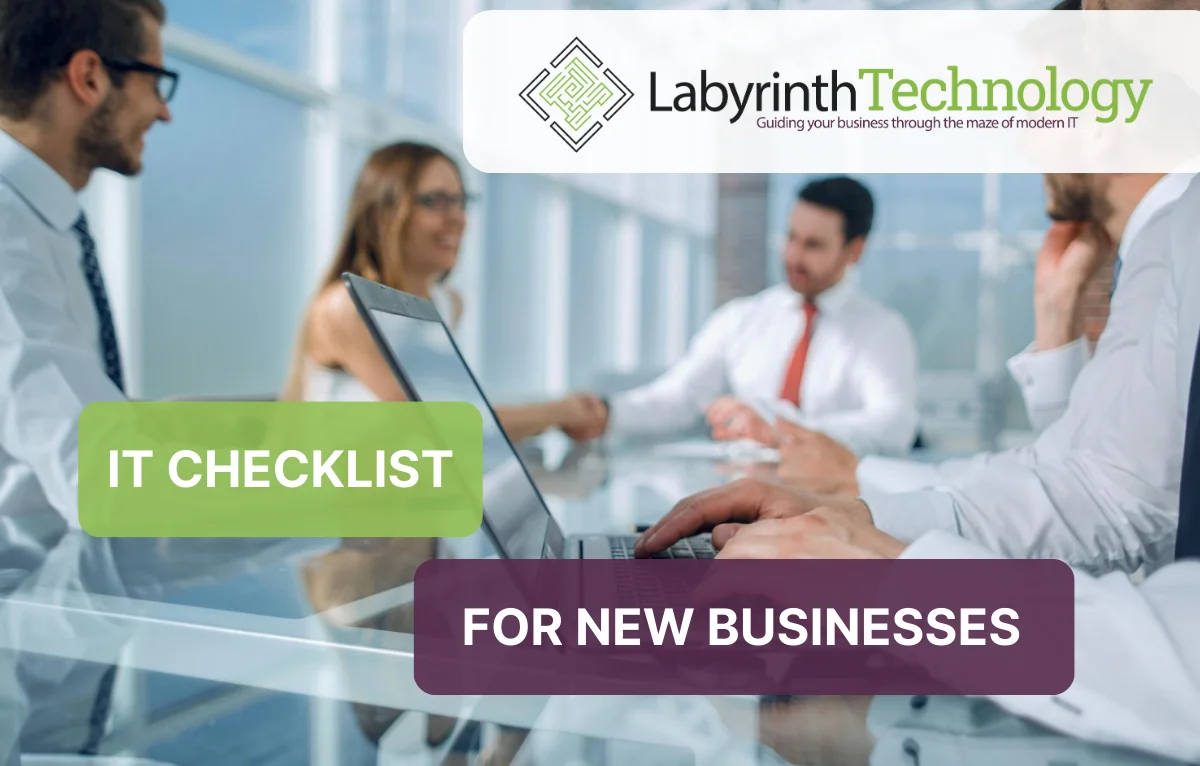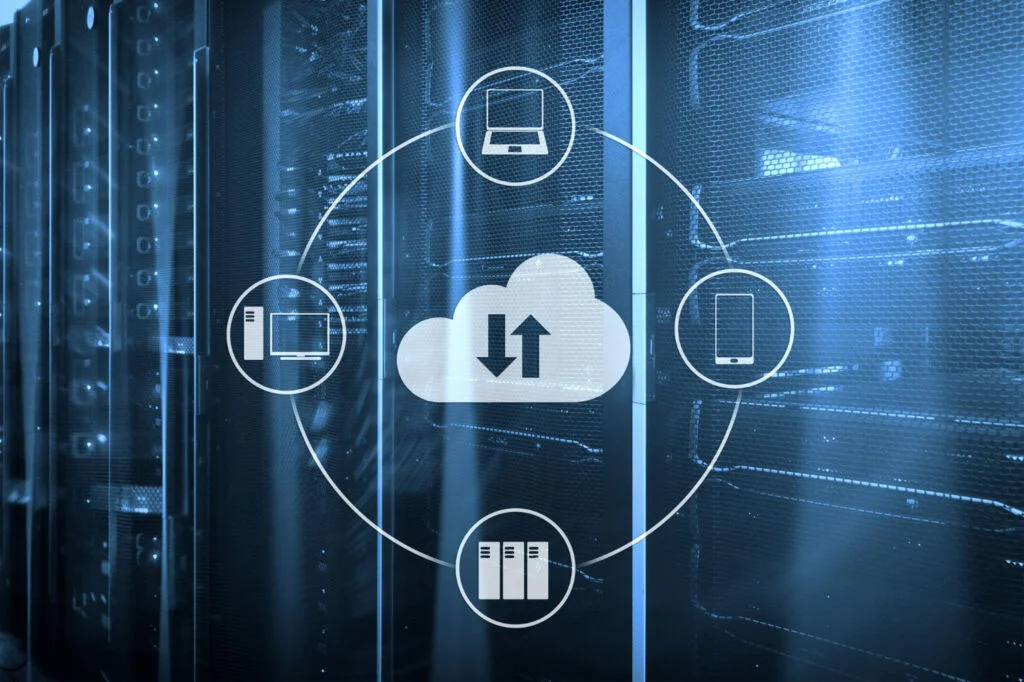
If you find yourself on this page, chances are you’re deeply invested in exploring the IT perspectives of a newly launched business. Congratulations on embarking upon this exciting journey! Or perhaps, you might simply be someone curious about the digital fundamentals crucial for business success in today’s world. Either way, you’re in the right place.
As a fresh face in this dynamic environment, it’s natural to find the countless of tech options and decisions a bit overwhelming. But fear not – you’re not alone on this journey. Understanding the importance of a strong digital foundation is the first step towards future success.
This essential IT checklist is tailored specifically for new businesses – for those bold innovators and visionaries who are transforming ideas into reality. Our aim is to demystify the technical complexities and equip you with a straightforward, effective strategy. From making smart technology investments to ensuring your digital assets are well-protected and planning for scalable growth, we cover it all.
Your internet connection is the lifeline of your business. It’s crucial to choose a service provider known for reliability and excellent customer support. Look for providers offering high uptime guarantees – this means your connection will be consistently available, reducing the risk of costly business interruptions. Consider the bandwidth requirements for your operations; more bandwidth ensures faster data transmission, which is vital for tasks like video conferencing, cloud computing, and large file transfers.
For businesses requiring the utmost in speed and reliability, a leased line is a formidable option to include on their IT checklist. Unlike standard broadband services, a leased line is a dedicated internet connection. It means you don’t share bandwidth with others, ensuring consistent high speeds and exceptional reliability. Leased lines come with symmetric upload and download speeds, which is invaluable for businesses that upload large files regularly or use real-time communication tools extensively. Though more expensive than traditional broadband, for businesses where internet connectivity is critical, a leased line can be a wise investment.
Your chosen internet solution should be able to scale with your business. As your company grows, your internet needs will evolve, and your provider should offer solutions that cater to this growth. Don’t forget to inquire about business-specific plans that may offer enhanced security and prioritised support.
The right hardware forms the backbone of your IT infrastructure. This includes not just computers, but also servers, printers, routers, and other peripherals. While high-end, powerful machines are tempting, it’s important to balance performance with budget. Opt for reliable brands with strong after-sales support. If your business model relies heavily on IT, consider investing in a server to manage data and applications centrally. However, for smaller setups or those preferring flexibility, cloud-based solutions can be a cost-effective and scalable alternative. Remember, ergonomic and high-quality peripherals like keyboards, mice, and monitors can boost productivity and are often worth the investment.
We highly recommend the following hardware essential:
A well-planned network is essential for efficient communication and data exchange within your business. Structured cabling for a wired network ensures stability and high-speed connectivity, ideal for data-intensive tasks. However, the flexibility and ease of installation of wireless networks make them a popular choice, especially for businesses with a need for mobility or those in rented spaces where extensive cabling isn’t feasible. For optimal performance, consider a hybrid network that combines both wired and wireless elements. Also, implement network security measures like firewalls and secure Wi-Fi access points to protect your business from cyber threats.
Cloud solutions offer unparalleled advantages in terms of flexibility, efficiency, and scalability, making them an ideal choice for new businesses to include on their IT checklist. However, these benefits are not exclusive to new enterprises; all businesses, regardless of their size or stage in the business lifecycle, should consider leveraging cloud solutions. The adaptability and cost-effectiveness of cloud computing make it a valuable asset for businesses looking to streamline operations, enhance data security, and foster collaboration, among other benefits.
Why Cloud Storage? The primary advantage of cloud storage is its accessibility. You can access your data from anywhere in the world, at any time, provided you have an internet connection. This flexibility is vital for businesses with remote teams or those that require frequent travel.
The cloud simplifies the backup process. Automated backup options ensure your data is regularly saved, reducing the risk of data loss due to hardware failure, cyber-attacks, or human error. In the event of data loss, cloud services offer efficient recovery solutions to minimise downtime.
Moreover, cloud storage providers invest heavily in security measures, offering layers of protection that may be challenging to replicate in-house. They use encryption, multi-factor authentication, and regular security audits to safeguard your data. Furthermore, scalability is an other advantage of cloud storage. As your business grows, your data storage needs will evolve. Cloud services allow you to scale your storage capacity up or down based on your current needs, ensuring you’re not paying for unused space.

Cloud-based collaboration tools allow your team to work together seamlessly, regardless of their physical location. They can share, edit, and comment on documents in real-time, improving productivity and communication. Tools like Microsoft 365, SharePoint, Teams offer a suite of applications that integrate seamlessly with each other. This integration allows for a flexible work environment where documents, emails, calendars, and communication tools are all accessible in one place.
These platforms offer customisation options to suit your business needs. You can control user access, ensuring that sensitive information is only accessible to authorised personnel. By using cloud-based tools, you save on the cost of purchasing and maintaining physical software and hardware. These tools typically operate on a subscription model, which can be more cost-effective and allow for better budget management.
Prioritising cyber security is essential in safeguarding your business as it protects against a multitude of digital threats that can compromise sensitive data and disrupt operations. With a good cyber security strategy, you’re not only defending your company’s data but also its reputation and the trust it has with customers.
Moreover, with regulations like GDPR in place, ensuring cyber security compliance is not just about security, but also about legal and financial integrity. By prioritising cyber security, businesses can operate with confidence, knowing that their digital assets and customer information are secure and protected.
One of the essential parts of robust cyber security involves deploying reliable antivirus software and a robust firewall. A good antivirus is your first line of defence, offering real-time scanning, malware and phishing protection. It’s important to select one that is well-reviewed and trusted in the industry. Alongside, a robust firewall serves as a critical barrier, protecting your internal network from untrusted external sources and preventing unauthorised access. For businesses looking for an all-encompassing solution, unified threat management (UTM) systems can provide comprehensive security, including both antivirus and firewall capabilities.
Another key aspect of cyber security is the regular updating of all software. This includes operating systems, applications, and security tools. Keeping software up-to-date is vital in protecting against the latest threats. Implementing a policy for regular updates and using patch management tools can automate this process, ensuring that all systems are continually protected. It’s also important to educate your team on the significance of these updates and guide them on applying them to their devices.
The implementation of multi-factor authentication (MFA) adds an essential layer of security. MFA requires two or more verification factors, greatly reducing the risk of unauthorised access. Secure Wi-Fi networks are also important; ensure your business Wi-Fi is secure, encrypted, and hidden, and consider using a VPN for added security. Providing a separate network for guests can protect your main network from external threats.
Employee training and awareness form the backbone of a secure IT environment. Regular training sessions on cyber security best practices and awareness of common threats like phishing and ransomware are vital. Creating a culture of security awareness where employees feel responsible for the digital safety of the company can significantly enhance your cyber security posture. Simulated cyber-attack exercises can also prepare your team for real-world scenarios.
In the initial stages of a business, it’s easy to overlook the importance of a Disaster Recovery Plan (DRP). However, its inclusion in IT checklist for new businesses is crucial for several reasons.
It’s vital for managing risks such as data loss and operational disruptions, which can be particularly damaging in the early stages of a business. This plan not only ensures swift recovery of critical data but also maintains business continuity, a key factor in building client trust and credibility in a competitive market.
Moreover, a DRP fosters a proactive approach towards potential threats, enhancing your business’s resilience. This forward-thinking approach not only prepares you for immediate threats but also fosters a culture of preparedness and adaptability within your organisation, which is invaluable for long-term success. It also demonstrates compliance with data protection regulations like GDPR, reinforcing your commitment to data security. Overall, a DRP is fundamental in establishing a reliable, prepared, and legally compliant business foundation.
I know as a new business owner, your first thought might not be about what happens if you suddenly outgrow your IT solutions. However, planning for growth from the outset is a critical step in ensuring your business’s long-term success and sustainability. Your IT infrastructure should be designed not just for today, but for the future. As your business expands, so too will your IT needs. This is where the concept of scalable solutions becomes pivotal.
Opting for IT solutions that can scale means investing in technology that can adapt and grow with your business. It’s about future-proofing your investment. For instance, cloud-based services are ideal as they offer flexibility and scalability. They allow you to increase storage or upgrade systems without the need for substantial upfront costs or overhauling your existing setup.
Moreover, the importance of regular IT reviews cannot be overstated. These reviews are your opportunity to ensure that your IT infrastructure not only meets your current needs but is also aligned with your evolving business goals. Think of it as a health check for your technology environment. Regular audits can identify areas for improvement, potential security risks, or even opportunities for cost savings.
When launching a new business, it’s vital to acknowledge that IT is a complex field, full of nuances that can significantly impact your operations. This is where the value of external IT support, such as the services provided by Labyrinth Technology, becomes apparent.

Expert IT support is more than just a service; it’s a strategic partnership that offers expert guidance, manages risks effectively, and provides cost-effective, tailored solutions. These firms bring a wealth of knowledge, staying updated on technological advancements and cyber security, ensuring your business doesn’t just cope but thrives. They play a crucial role in risk management, particularly for new businesses vulnerable to cyber threats and data breaches, by offering robust defence mechanisms and rapid incident response.
Additionally, outsourcing IT support is a cost-effective strategy, eliminating the need for a full-time in-house IT department and allowing you to focus on core business activities without technical distractions. Beyond addressing current IT needs, professional IT support is about future-proofing your business, advising on scalable solutions and implementing new technologies to maintain a competitive edge.
This comprehensive approach to IT management not only ensures every item on your IT checklist for new businesses is efficiently addressed but also guarantees seamless integration of IT components, ongoing adaptability, and peace of mind. With such support, your business enjoys the benefits of a robust, dynamic, and supportive IT infrastructure, paving the way for a smooth and successful operational journey.
At Labyrinth Technology, we understand that each new business is unique, with its own set of challenges and aspirations. At Labyrinth Technology, we’re not just another IT support firm; we are your partners. What sets us apart is our unique approach to client relationships. We believe in earning your trust and loyalty every single day, which is why our clients are never bound by long-term commitments. Our contracts operate on a flexible 30-day rolling basis, a testament to our confidence in delivering exceptional service that keeps our clients with us by choice, not by obligation. We constantly strive to provide the best customer service and support in the business, knowing that excellence is the key to lasting partnerships.
Our philosophy is simple: No jargon, no overselling, just straightforward, best-advice solutions. With over 20 years of experience providing IT support to London’s businesses, we’ve honed our technical proficiency and quality of service to a level that we believe makes us the most desirable IT support solution provider in the area. We don’t tie you down; instead, we focus our efforts on delivering the highest standards of customer service, so you’ll want to stay with us for the value we add to your business.
Are you looking for an IT support partner who truly understands your business needs? Join us at Labyrinth Technology, where flexibility meets expertise. Reach out to us today, and let’s start a conversation about how we can tailor our IT solutions to drive your business forward. With Labyrinth Technology, you gain a partner who is invested in your growth, offering scalable solutions, cutting-edge technology, and proactive support. Choose us for a seamless, secure, and innovative IT journey tailored to your business needs. Contact us now – your journey towards hassle-free and empowering IT support begins here.
Empowering London Businesses with Efficient IT Solutions to Save Time and Stay Ahead of the Competition.